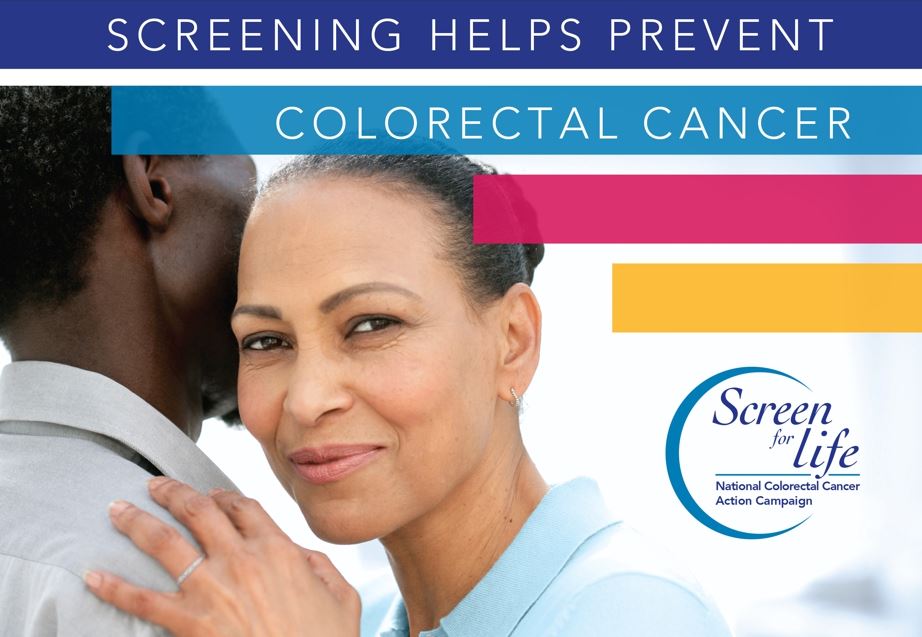Colorectal cancer is the third most common cancer in the United States and the second leading cause of death from cancers that affect both men and women. Colorectal cancer affects people in all racial and ethnic groups and is most common in people age 50 and older.
The good news? The best way to prevent colorectal cancer is to get screened regularly starting at age 50. There are often no signs or symptoms of colorectal cancer – that’s why it’s so important to get screened. If everyone age 50 and older got regular screenings, 6 out of 10 deaths from colorectal cancer could be prevented.
People over age 50 have the highest risk of colorectal cancer. You may also be at higher risk if you smoke, are African American, or have a family history of colorectal cancer. The U.S. Preventive Services Task Force recommends screening beginning at age 50. Some groups recommend starting earlier, at age 45.
You should begin screening for colorectal cancer soon after turning 50, then continue getting screened at regular intervals. However, you may need to be tested earlier than 50, or more often than other people, if—
- You or a close relative have had colorectal polyps or colorectal cancer.
- You have an inflammatory bowel disease such as Crohn’s disease or ulcerative colitis.
- You have a genetic syndrome such as familial adenomatous polyposis (FAP) or hereditary non-polyposis colorectal cancer (Lynch syndrome).
If you think you are at increased risk for colorectal cancer, speak with your doctor about—
- When to begin screening.
- Which test is right for you.
- How often to get tested.
Use this calculator together with your doctor to find out your risk of colorectal cancer.
What You Can Do to Prevent Colorectal Cancer
The best way to prevent colorectal cancer – or find it early – is to get tested starting at age 50.
Talk with your doctor about getting screened. Print these questions to ask your doctor about colorectal cancer screening. Take them to your next checkup.
What about cost? Under the Affordable Care Act, the health care reform law passed in 2010, most insurance plans must cover screening for colorectal cancer. Depending on your insurance plan, you may be able to get screened at no cost to you.
- If you have private insurance or Medicare, find out about Medicare coverage for different colorectal cancer screening tests. You may need to talk to your insurance company to find out what’s included in your plan.
- If you don’t have insurance, you can still get important screening tests. To learn more, find a health center near you.
To learn more about other preventive services covered by the Affordable Care Act, visit HealthCare.gov.
Get support. If you are nervous about getting a colorectal cancer test, get support:
- Ask a family member or friend to go with you.
- Talk with people you know who have been screened to learn what to expect.
Give support. Do you know someone age 50 or older who hasn’t been tested for colorectal cancer yet? Use these tips to start a conversation about the importance of screening.
Quit smoking. People who smoke are more likely to get colorectal cancer. If you smoke, make a plan to quit today.
Watch your weight. Being overweight increases your chance of developing colon cancer. Find out how to control your weight.
Get active. Regular exercise may help reduce your risk of colorectal cancer. Take these steps to get moving today.
Drink alcohol only in moderation. Drinking too much alcohol may increase your risk of colorectal cancer. If you choose to drink, have only a moderate (limited) amount. This means:
- No more than 1 drink a day for women
- No more than 2 drinks a day for men
Talk with your doctor about taking aspirin every day. Taking aspirin every day can lower your risk of colorectal cancer, heart attack, and stroke. But it’s not right for everyone. If you are age 50 to 59 and have risk factors for heart disease, ask your doctor if daily aspirin is right for you.
Source: Healthfinder.gov

